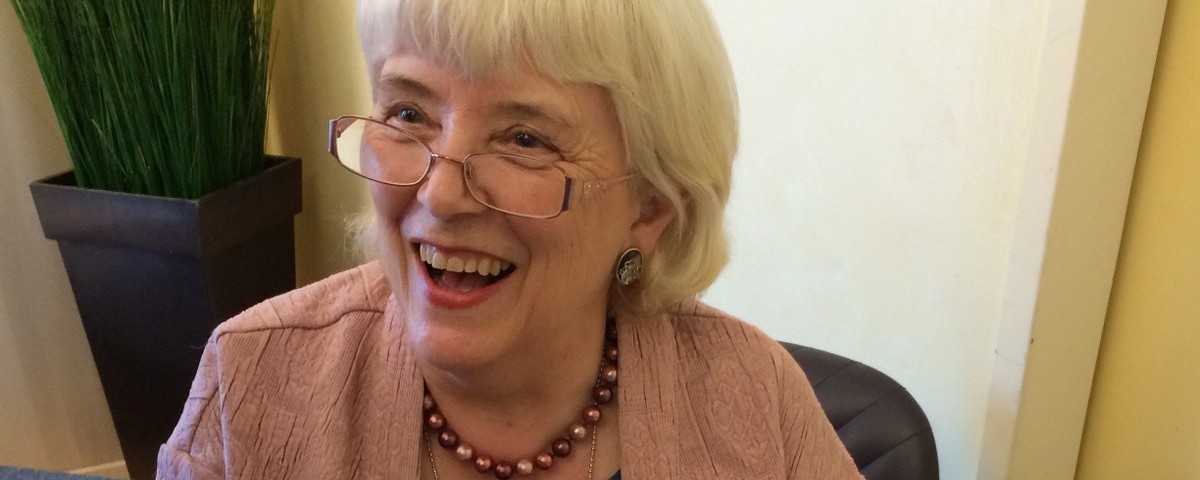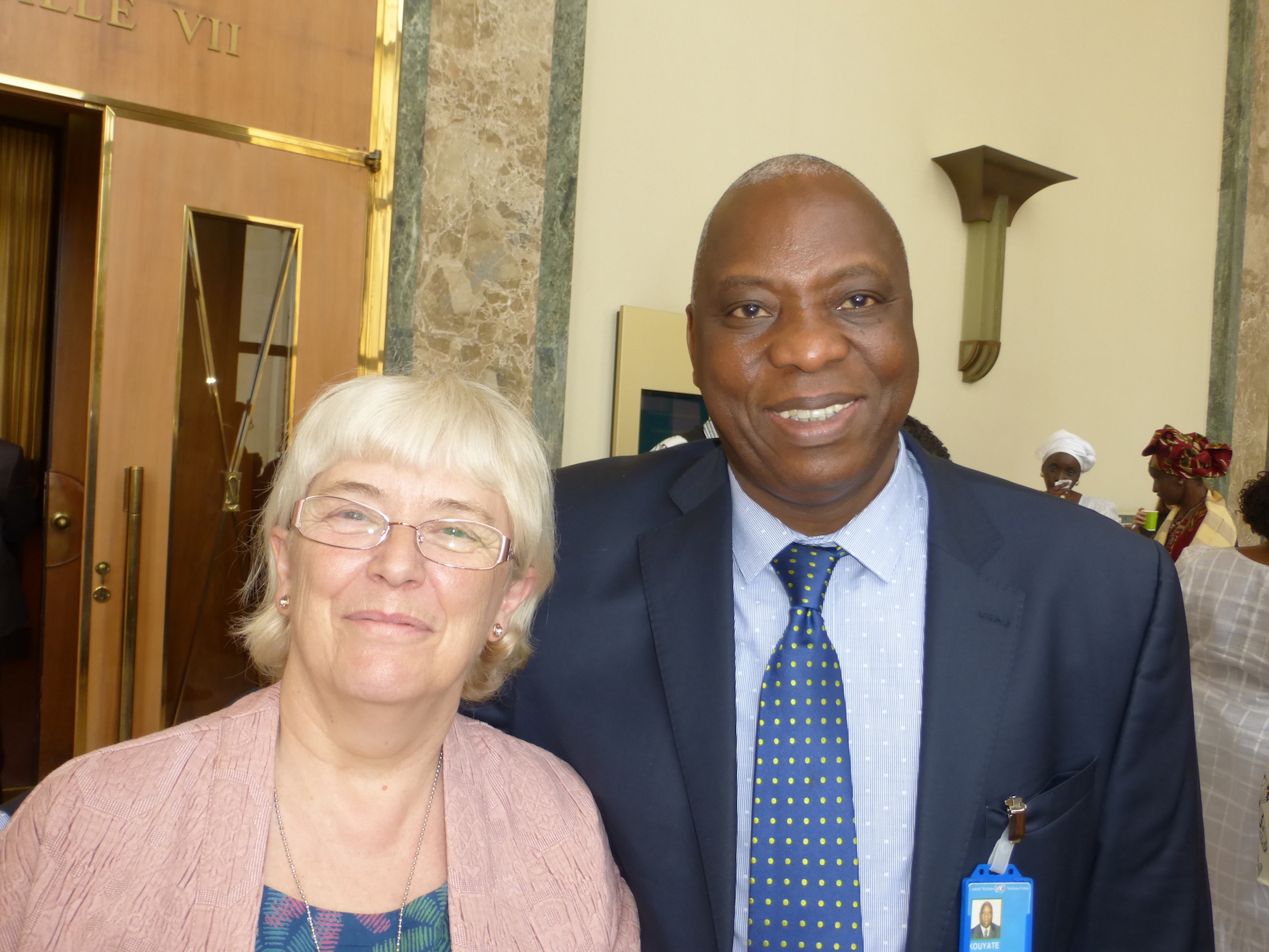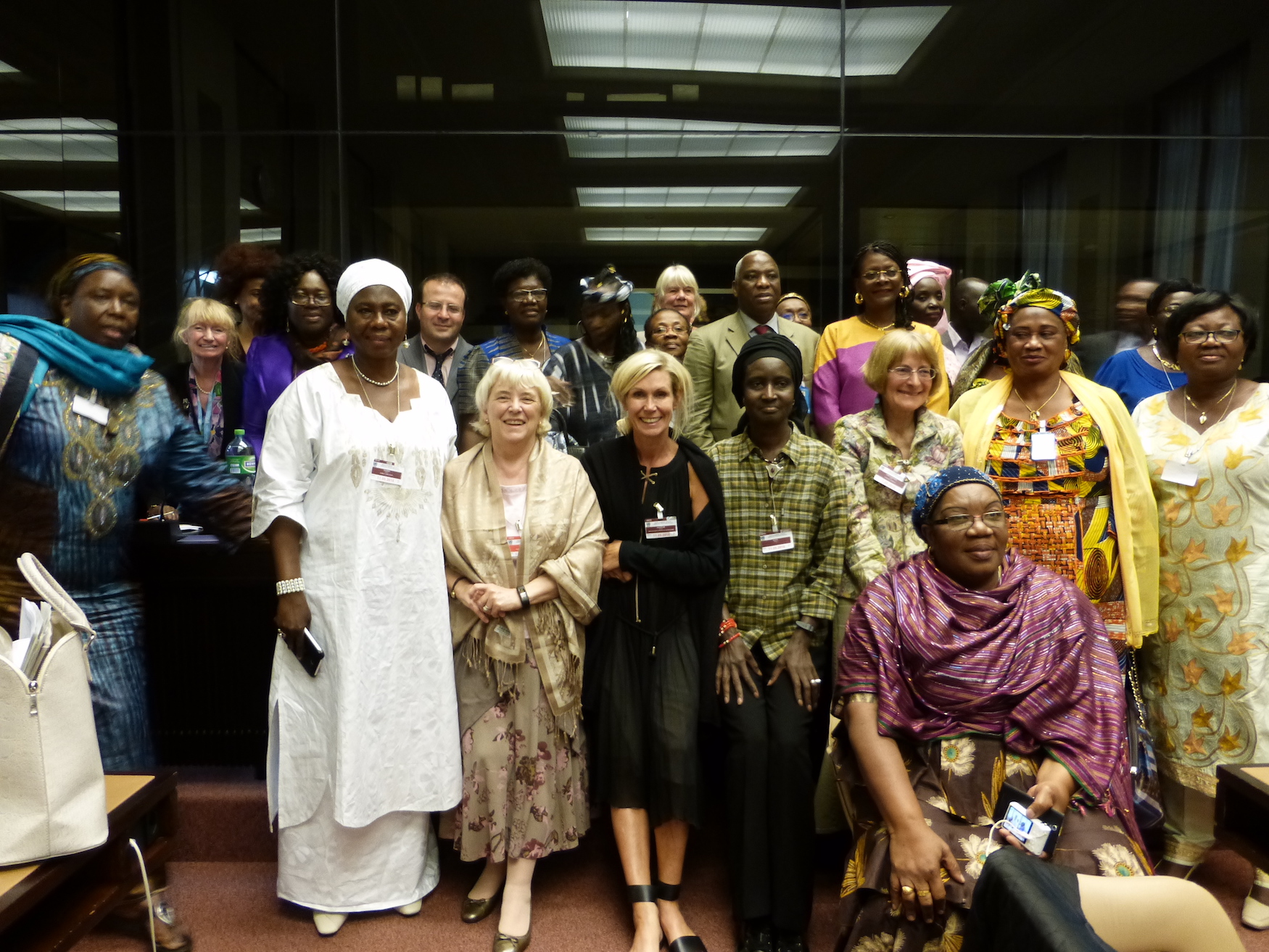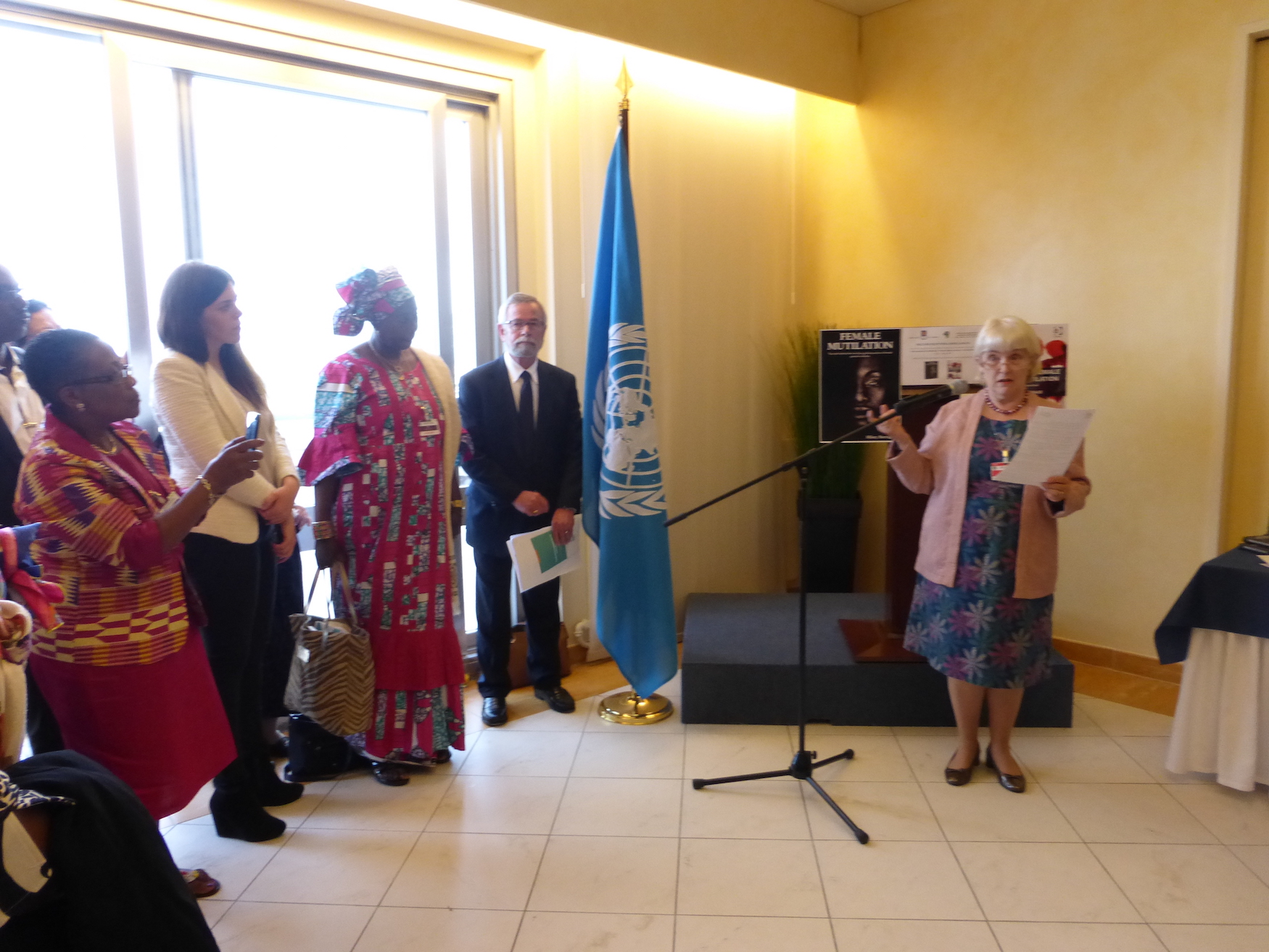An Interview With Hilary Burrage: How She’s Fighting to Stop FGM in the UK

Hilary Burrage, British sociologist and author, on the fight against FGM: We must never, for one moment, be complacent!
Hilary Burrage is a sociologist, author of two books on female genital mutilation (FGM), and a consultant on FGM for the Guardian newspaper. Previously a college lecturer, Ms. Burrage is currently campaigning to STOP FGM in the UK. The AHA Foundation spoke with her about her experience in fighting to end FGM. She tweets as @HilaryBurrage and her website is: https://hilaryburrage.com
AHA: Could you share with us how you began working on the issue of FGM?
Ms. Burrage: I first heard of FGM (then called ‘female circumcision’) back in the 1980s, from my Mum, a Quaker and member of Amnesty, now in her 90s. Deeply alarmed, I wrote to my Member of Parliament but he told me not to worry, it was all fixed because we had a new law banning FGM.
If only my MP had been right…! It wasn’t until the early years of this century that I realised his optimism was far from justified. I saw on the Internet announcements of the Day of Zero Tolerance to FGM and began to research the facts. Horrified by what I learnt and, having spent most of my professional life as a sociologist teaching and researching social issues, equality and policy, I decided I would have to act on what I was discovering.
And so, having retired previously for health reasons, I began to use my time to lobby and raise awareness about FGM via the Internet and social media. A couple of years later I was approached by two different publishers to write books on FGM*, then, towards the end of 2013, the Guardian began their #EndFGM Global Media Campaign and they asked me to be their consultant. Since that time my ‘retirement’ has been in theory only. I’m a completely free agent but my focus is firmly on finding ways to protect and help girls and women facing FGM and other human rights abuses.
[*Eradicating Female Genital Mutilation, and Female Mutilation]
…even now few people, even in regulated professional caring roles, are confident about what to do if they suspect a child is at risk or has been harmed (from FGM).
AHA: Over the years, what trends have you noticed regarding FGM in the UK? Has the situation improved or gotten worse?
Ms. Burrage: The really big shock, now three or four years ago, was realizing that estimates of FGM prevalence in the UK were woefully understating the problem. There are not, as we had thought, ‘only’ twenty or thirty thousand British-based women and girls who underwent or are at significant risk of FGM, there are around 140,000 of them, spread across the whole of the United Kingdom, a figure proportionately comparable to the half million both in the USA and in mainland Europe.

Hilary Burrage and Dr. Morissanda Kouyate, the Executive Director of the IAC (Inter-African Committee)
We know these figures make sense because as of last year, hospitals in England have to report when they encounter patients with FGM (the reporting is anonymous unless the person is a child, when protection must be considered), and there are around one hundred cases reported every week even on that basis.
The absolute figures have almost certainly risen over the past decade, but that’s probably because of demographic change – there are now more people in Britain from traditionally practising nations and communities. When people in the diaspora move to western countries usually one of two things happen: either practices such as FGM are abandoned because there is a new way of life or, in some instances, migrants, in what may feel to be a strange and possibly bewildering different place, put even more emphasis on tradition and heritage, so FGM can feature again in groups which had ‘at home’ almost given this practice up.
When I was first alerted a decade ago, almost nobody in the UK knew much, if anything, about FGM. Now people from all walks of life – politicians, legal, education, health and care professionals, journalists, artists, taxi drivers and shop-keepers, the person on the street – are to some extent aware of it. This is obviously good news although even now few people, even in regulated professional caring roles, are confident about what to do if they suspect a child is at risk or has been harmed. I attended two Parliamentary meetings which considered mandatory reporting of FGM only last week, and there is still a very long way to go.
…in developed nations we do have more resources – assuming policy makers can be persuaded to use them – to enforce that (FGM) prohibition.
Concerning the increased prevalence of FGM in the UK, I would add, however, that in a way the newly emerging figures, whilst extremely alarming, are also helpful. If people in the diaspora come into countries such as Britain they must learn that FGM is absolutely not OK, and this can only be for the good. For many their country of origin also prohibits FGM, but in developed nations we do have more resources – assuming policy makers can be persuaded to use them – to enforce that prohibition.
I have been following the UK situation closely for some years (my book Eradicating Female Genital Mutilation offers as a ‘case study’ the subtitle ‘A UK Perspective‘), and I am cautiously hopeful that, although the absolute numbers in Britain are daunting, the situation is beginning to be addressed. But I am also acutely conscious that we must never, for one moment, be complacent.
(Harmful Traditional Practices) are economic crimes in a very fundamental sense, and they have massive fiscal impacts on the communities and even on the nations where they are practised… These practices won’t stop whilst there is significant financial reward to be gained.
AHA: What do you think is the most effective approach for addressing FGM?
Ms. Burrage: Firstly, FGM is not ‘just a single thing’ on its own. It is one aspect of the whole grim issue of Harmful Traditional Practices (HTPs) and must be seen as such. Whether the overt rationale has moved on or not, all these practices comprise aspects of patriarchy incarnate – the literal imposition of men’s will onto female bodies – and all of them are at base concerned with money. In other words, they are economic crimes in a very fundamental sense, and they have massive fiscal impacts on the communities and even on the nations where they are practised.
The individual suffering is always paramount, but with 200 million women and girls alive today who have experienced FGM, even before we consider other HTPs, I suspect that overall these gendered crimes are almost akin to human trafficking in their global economic consequences over time.
Most enforcement agencies at every level from local to international have barely begun to acknowledge either the human rights or the economic aspects (of FGM).
It follows that a very committed emphasis on the criminal aspects of FGM is essential. These practices won’t stop whilst there is significant financial reward to be gained. Most enforcement agencies at every level from local to international have barely begun to acknowledge either the human rights or the economic aspects, however.
Alongside this there is very important work to be done in educating communities – girls and boys, men and women alike – on the grim outcomes of FGM and other traditional practices. Even knowledge of anatomy is often lacking, and sometimes the men are unaware of the impacts, whilst the women believe them simply to be a ‘normal’ part of womanhood.
…education and enforcement go hand-in-hand in the eradication of FGM and, indeed, of all HTPs.

UN Geneva Book Launch at the IAC Conference
But despite the external reality that FGM is extremely damaging to young women’s future prospects, some community members will continue to believe that FGM and, probably, early / forced ‘marriage’ is essential for their daughters. This belief must be challenged.
It is a fundamental duty of democratic nations, both generally and also specifically in regard to FGM, to ensure that girls and boys alike receive an education. In developed nations the issue of school drop-out when girls reach the puberty are not an obstacle, and it is vital to ensure also that girls don’t disappear for other reasons either. Plus, we must make it clear to all children that whilst marriage is never a necessary condition for adult status, education is.
Of course people in different traditions will see status and honour in different ways, but these are in the end private matters which individuals must resolve for themselves. No-one has a right to say how mature individuals should live their lives; but our society overall has an absolute obligation to ensure that every child reaches adulthood healthy, unharmed and well-equipped to cope as their own person with the obligations and opportunities which becoming grown up brings.
So, in summary, education and enforcement go hand-in-hand in the eradication of FGM and, indeed, of all HTPs.
Politicians may like standing shoulder-to-shoulder with brave survivors of FGM, but they are in my UK experience less enthusiastic, even when they provide some funding, about actually delivering on properly thought-out (inter)national provision to deliver eradication.
AHA: What are the barriers to preventing FGM from happening in wealthy countries like the UK or the US?
Ms. Burrage: Political will is the main barrier, with the corollary that this can only be driven or supported by corresponding public concern.

UN Geneva Book Launch at the IAC Conference
Politicians may like standing shoulder-to-shoulder with brave survivors of FGM, but they are in my UK experience less enthusiastic, even when they provide some funding, about actually delivering on properly thought-out (inter-)national provision to deliver eradication. Yes, the British Government has promised creditable sums to international programmes; plus in the UK we have had reasonably good legislation for some decades, and multi-agency guidance also for a while now. But UK funding to stop FGM has not been generous and the impact here remains far from impressive – not as yet even one successful prosecution, for instance.
Some European countries such as France (with about 100 convictions since the 1980s) have gone for criminal investigations on the basis of already enacted general legislation such as the prohibition of bodily harm, whilst others, including the UK, have taken forward specific legislation which as of very recently even includes specific protection orders. This appears to be having some small measure of positive, increased traction.
But we don’t as yet know in any detail how much impact various methodologies have. Either way – general (no need for new legislation) or specific (legally better, but takes time to bring to statute) – could be reasonably effective as long as there is full attention also both to context: what, we must ask, does the community need to know in order to make sense of the legal action and to provide proper public resourcing.
At the moment however, as various narrators say in my second book, Female Mutilation: The truth behind the horrifying global practice of female genital mutilation (which reports on activity in five continents, including North America, Australia and Europe) much of the on-going effort is by members of local communities who receive little substantive resourcing or genuine support from the professionals who are also involved. No wonder these activists are cynical about the sincerity and determination of their political leaders.
AHA: What needs to happen for FGM to be eradicated?
Ms. Burrage:
1. In the end, money speaks louder than words.
We can talk forever about the absolute necessity to end FGM and other cruel patriarchal practices, but whilst the economic rewards of undertaking these practices outweigh the impacts of investment by our leaders in eradication, they will continue.
2. Likewise, use the right words.
In my view the euphemisms must go, now: no more glossing over cruelty in formal public and professional discourse. We must tell it as it is: as the Inter-African Committee and many others insist, in formal discourse FGM is indeed female genital mutilation. It’s also essential to move from talking about ‘cultural practices’ to discussing FGM and the like as criminal harm, bad traditions and human rights abuses.
3. Spread the message!
Programmes such as the Guardian Global #EndFGM Media Campaign and training in places such as Kenya, Gambia and Nigeria, for young journalists can reach many, many corners of the globe. Likewise, be sure to include a whole range of people as activists and enforcers and make sure all relevant professionals are equipped with the knowledge and understanding they need to tackle FGM. And we also need to be talking to boys and men, in traditionally practising communities, in schools and other shared public places in the UK and US, and in political contexts.
4. Develop a proper paradigm.
I have tried in my writing to make the case for a conjoined discipline – maybe ‘FGM studies’? – which will bring together all the aspects of this very complex subject.
There is a danger that, without top-level direction and without a clear understanding of parameters for action for various types of activists and campaigners, we will begin – however much they are not intended – to see professional turf wars.
In nations such as the UK, the time simply for awareness-raising is past. Co-ordinated interdisciplinary research, analyses and actions are now the order of the day.
5. Remember the ‘4 E’s’ of Eradication:
- Engagement (in communities)
- Education (about FGM and, critically, also as preparation for adult life)
- Enforcement (legal protection and prosecutions, or FGM protection orders) … and
- Economics (addressing the fundamental bases of these human rights abuses).
….. and thank you, AHA Foundation, for asking me, and for all the good work that you do!
Let us know how your experiences of challenges and progress made against FGM compare to findings and opinions of Hilary Burrage. Write to us in the comments section below.

